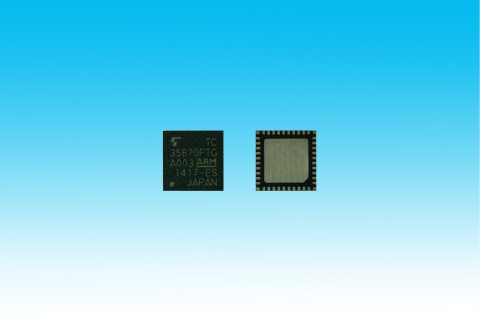Incorporating Two Kinds of Communication Functions for Wearable Healthcare Low Power Devices
TOKYO — (BUSINESS WIRE) — September 24, 2014 — Toshiba Corporation (TOKYO:6502) today announced the launch of “TC35670FTG”, a low power consumption dual function IC that supports both Bluetooth® Low Energy (LE)[1] communications and NFC Type 3 Tag. Sample shipments start today.

Toshiba launches low power consumption ICs "TC35670FTG" for Bluetooth(R) Smart communication devices with NFC Tag functions (Photo: Business Wire)
Recently, more and more Bluetooth® Smart[2] devices offer Bluetooth® LE compatibility. The new IC joins Toshiba’s line-up of Bluetooth® LE ICs, and offer two key features: easy operation of Bluetooth® pairing with NFC Tag function; long-time stand-by status for devices powered by small coin-cell batteries. The IC will facilitate adoption of Bluetooth® LE communications in small devices, such as wearable healthcare devices, sensors, toys and, most notably, future touch and start smartphone accessories.
Previously, set makers had to integrate ICs for both Bluetooth® and NFC Tag when designing a system supporting both communication functions. Toshiba’s new approach offers a design that will help to minimize the part counts, reduce the assembly area by about 30% and shorten system development.
The NFC Tag component has a 1.5 Kbyte E2PROM for storing data that set makers can access using both the Bluetooth® LE and NFC Tag to connect each I2C interfaces, allowing data to be easily handled in each system.
| These functionalities allow the new device to support three ways of use: | ||
| 1. |
Put both Bluetooth® LE and NFC Tag in stand-by mode and prioritize the connection from the 1st access. |
|
| 2. | By adding NFC Tag function, easy pairing of Bluetooth® LE devices can be realized and a long time stand-by status can be maintained. | |
| 3. | The NFC Tag can provide a system on/off switch function, and cut off the hardware switch from a lot of devices that are required to reduce stand-by power. | |
Key Features of the New Product
-
Low power consumption:
- Below 5.9mA at peak consumption of Bluetooth® communication (@3.3V, -4dBm transmitter output power or receiver operation)
- Below 600μA for NFC Tag communication (@3.3V)
- Below 0.5μA in deep sleep (@3.3V)[3]
- Receiver sensitivity: -92.5dBm
- Supports Bluetooth® LE central and peripheral devices
- Supports servers and client functions defined by GATT (Generic Attribute Profile)
- NFC Forum Type 3 Tag
Applications
Bluetooth® Smart devices, such as wearable devices, healthcare devices, smartphone accessories, remote controllers, and toys.
|
Main Specifications |
||
| Part Number | TC35670FTG | |
| Operating Voltage Range | 1.8V to 3.6V | |
| Current Consumption, Operation1 | Below 5.9mA (@3.3V, Bluetooth® LE operation, -4dBm Transmitter operation or Receive operation) | |
| Current Consumption, Operation2 | Below 0.6mA (@3.3V, NFC Tag operation) | |
| Current Consumption, Deep Sleep | Below 0.5μA (@3.3V)[3] | |
| Operating Temperature | -30°C to 85 °C | |
| Package | QFN40, 6mm x 6mm, 0.5mm pitch | |
| Bluetooth Part | ||
| Bluetooth® Version |
Ver. 4.0
Including central and peripheral functions |
|
| Transmitter Output Power | 0dBm to -20dBm (4dB steps) | |
| Receiver Sensitivity | -92.5dBm | |
| Profiles | GATT (Generic Attribute Profile), including server and client functions | |
| Interfaces | UART, I2C, SPI, GPIO, RF | |
| Other Features |
DC-DC Converter
Low drop regulator General purpose ADC User program function Wake up signal for host device PWM function |
|
| NFC Tag Part | ||
| Tag Communication | NFC Type 3 Tag (Felica Lite-S compatible) [4] | |
| Tag Communication Speed | 212Kbps / 424Kbps automatic switchover | |
| Non-volatile Memory | E2PROM, 2Kbyte (including about 1.5Kbyte of general user area implemented with error correction circuit) | |
| Security | Mutual recognition by Triple DES MAC (MAC: Message Authentication Code) | |
| Interfaces | I2C | |
| Other Features |
CRC automatic generation at data write and check at data read.
Internal RAM can relay data from wireless to wired device and vice-versa. |
|
Notes:
[1] Low power consuming communication technology defined as
Bluetooth® Ver. 4.0.
[2] Devices that adopt Bluetooth®
core specification Ver. 4.0 or higher with a low energy core
configuration, and that use GATT-based architecture specified in
Bluetooth® Ver.4.0.
[3] Stand-by mode by the minimum
consumption current.
[4] Produced under license of Sony
Corporation's FeliCa™ Lite-S technology.
* Bluetooth SIG owns the registered trademark, Toshiba uses it under
license.
* ARM and the ARM logo are trademarks or registered
trademarks of ARM Limited in the EU and other countries.
Customer Inquiries
Mixed Signal Controller Group
Tel:
+81-44-548-2821
Information in this document, including product prices and specifications, content of services and contact information, is current on the date of the announcement but is subject to change without prior notice.
About Toshiba
Toshiba Corporation, a Fortune Global 500 company, channels world-class capabilities in advanced electronic and electrical product and systems into five strategic business domains: Energy & Infrastructure, Community Solutions, Healthcare Systems & Services, Electronic Devices & Components, and Lifestyles Products & Services. Guided by the principles of The Basic Commitment of the Toshiba Group, “Committed to People, Committed to the Future”, Toshiba promotes global operations towards securing “Growth Through Creativity and Innovation”, and is contributing to the achievement of a world in which people everywhere live in safe, secure and comfortable society.
Founded in Tokyo in 1875, today’s Toshiba is at the heart of a global
network of over 590 consolidated companies employing over 200,000 people
worldwide, with annual sales surpassing 6.5 trillion yen (US$63 billion).
To
find out more about Toshiba, visit
www.toshiba.co.jp/index.htm
Photos/Multimedia Gallery Available: http://www.businesswire.com/multimedia/home/20140924005319/en/
Contact:
Media Inquiries:
Toshiba Corporation
Semiconductor & Storage
Products Company
Chiaki Nagasawa, +81-3-3457-4963
Email Contact